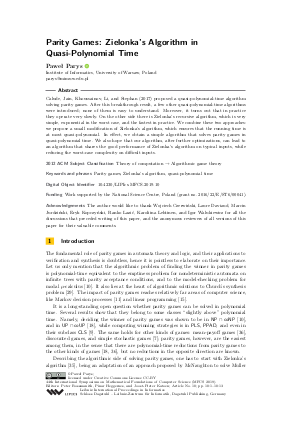@InProceedings{parys:LIPIcs.MFCS.2019.10,
author = {Parys, Pawe{\l}},
title = {{Parity Games: Zielonka’s Algorithm in Quasi-Polynomial Time}},
booktitle = {44th International Symposium on Mathematical Foundations of Computer Science (MFCS 2019)},
pages = {10:1--10:13},
series = {Leibniz International Proceedings in Informatics (LIPIcs)},
ISBN = {978-3-95977-117-7},
ISSN = {1868-8969},
year = {2019},
volume = {138},
editor = {Rossmanith, Peter and Heggernes, Pinar and Katoen, Joost-Pieter},
publisher = {Schloss Dagstuhl -- Leibniz-Zentrum f{\"u}r Informatik},
address = {Dagstuhl, Germany},
URL = {https://drops.dagstuhl.de/entities/document/10.4230/LIPIcs.MFCS.2019.10},
URN = {urn:nbn:de:0030-drops-109543},
doi = {10.4230/LIPIcs.MFCS.2019.10},
annote = {Keywords: Parity games, Zielonka’s algorithm, quasi-polynomial time}
}

 Creative Commons Attribution 3.0 Unported license
Creative Commons Attribution 3.0 Unported license


